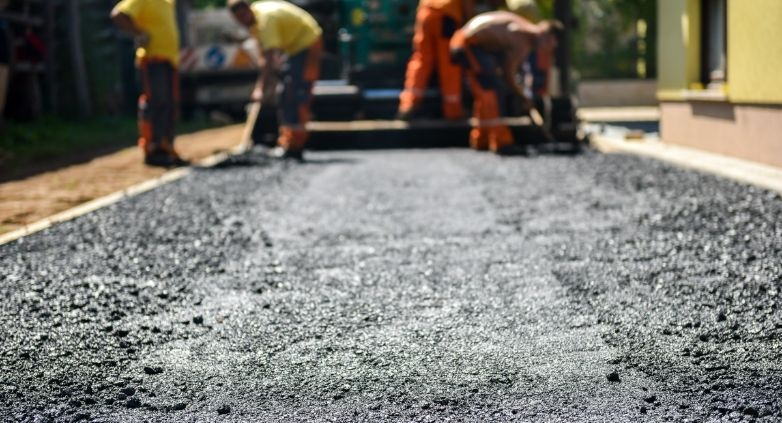Asphalt over Gravel Driveways – Exploring Pros & Cons
A well-designed driveway not only enhances the curb appeal of a property but also serves as a functional and durable surface for vehicles and foot traffic. One common choice homeowners face when considering driveway materials is whether to opt for asphalt or gravel. In this discussion, we will delve into the advantages and considerations surrounding asphalt over gravel driveways, exploring the key factors that influence this decision.
When evaluating driveway options, the choice between asphalt and gravel involves considerations such as cost, durability, maintenance, and aesthetic appeal. Asphalt driveways, highlighted by their smooth and uniform surface, resist weeds and erosion. This makes them particularly appealing to those desiring a low-maintenance and enduring solution. Despite the merits of gravel driveways, asphalt emerges as a compelling choice for individuals prioritizing both durability and a sleek appearance.
Discover the advantages of asphalt over gravel driveways. We’ll discuss installation costs, maintenance, and overall lifespan, offering valuable insights for homeowners and contractors alike. This concise exploration aims to assist in the decision-making process.
Is it possible to install asphalt over gravel driveways?
Yes, it’s possible to get your gravel driveway paved with asphalt. The process requires a few reasonably easy steps that need to implement to complete the paving project. You can pave straight over gravel or strip the gravel and start new based on the situation. Bear in mind, however, that this is not a DIY project as you will be needing expert paving contractor assistance.
Gravel driveway vs. asphalt driveway, which is better?
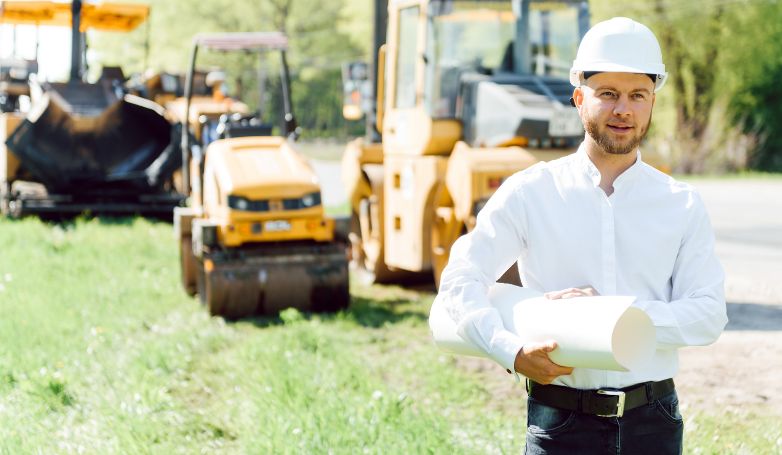
Selecting between a gravel driveway and an asphalt driveway involves careful consideration of unique advantages and drawbacks. Deciding whether gravel or asphalt is better is nuanced and influenced by specific requirements, budget constraints, and property features. Gravel driveways may offer rustic charm and cost-effectiveness, while asphalt driveways provide a sleek, durable surface. The optimal choice depends on a personalized evaluation of individual needs, ensuring the selected material aligns with preferences and practical considerations.
Read now: GRAVEL VS. ASPHALT DRIVEWAY: WHICH IS SUITABLE FOR YOU?
Why switch from gravel to an asphalt driveway?
While gravel is one of the most affordable paving options and requires low maintenance, it can collapse due to various environmental and weather conditions such as rainwater and snow.
Removing the snow can be challenging, and the much-used gravel parking lots and driveways are more likely to grow cracks, holes, and ruts. Besides, Dust, dirt, and debris can accumulate and contribute to the weathering process.
The better choice is to turn to asphalt if you are having some common problems with your gravel driveway.
Pros and Cons of Asphalt and Gravel Driveways
Even if you choose to pave asphalt over gravel driveways, it is important to know what the two materials feature. When considering which sort of material to use when carrying out a driveway installation, there are several variables to consider.
The product used for your driveway not only has a significant impact on its appearance but also influences its longevity and performance.
We want to closely compare gravel and asphalt to help carve down your choices and see which is better in various circumstances and their particular advantages and disadvantages.
Asphalt driveways
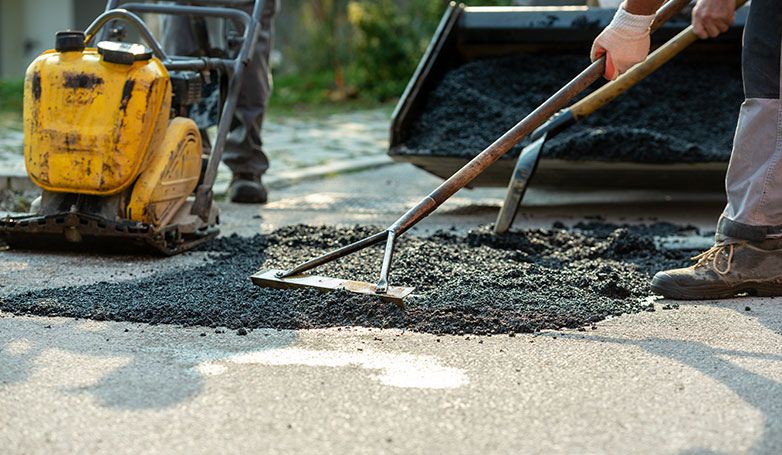
Asphalt, like gravel, is a cost-effective driveway surface option, although the price can change because the material is an oil-based product. An asphalt driveway that is properly paved will perform like a concrete surface but at a reduced cost. Also, asphalt is resilient since it is a petroleum product, making it less prone to changing temperatures and climatic conditions. The below pros and cons will help you to decide whether asphalt is the best option for you:
Pros
Here are the pros of asphalt over gravel driveways.
Longevity
An asphalt driveway is renowned for its impressive longevity, standing the test of time for a span ranging from 12 to 35 years. This extended lifespan is contingent upon various factors, including the prevailing climate, the quality of installation, and patterns of usage. Regular and proper maintenance becomes the cornerstone for ensuring the maximum lifespan of an asphalt driveway.
Low cost
The economic appeal of asphalt driveways is a major draw for homeowners seeking an elegant aesthetic without breaking the bank. Choosing asphalt over alternatives, such as gravel or more elaborate paving materials, often translates to a cost-effective solution. This affordability not only aligns with budget considerations but also contributes to the widespread popularity of asphalt driveways.
Flexible in extreme weather conditions

One of the standout features of asphalt is its exceptional flexibility, especially under challenging climatic conditions. Unlike gravel or certain rigid paving materials, asphalt exhibits a notable resilience to cracking. Its ability to adapt to temperature variations makes it a sturdy choice, capable of maintaining its structural integrity regardless of weather conditions.
Ease of Repair
Another advantage lies in the ease of repairing asphalt driveways. In the event of cracks or potholes, the repair process is generally straightforward and can be promptly executed. This facilitates cost-effective and efficient maintenance, ensuring the driveway’s continued performance over the years.
Cons:
Here are the cons of asphalt over gravel driveways.
Style limitations
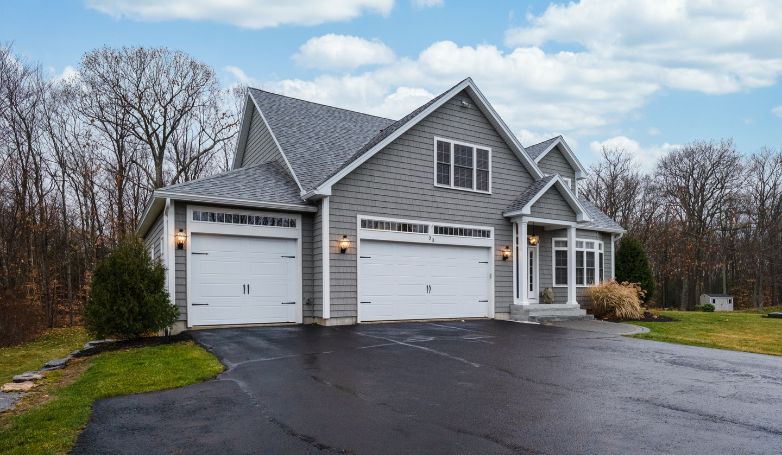
While asphalt driveways contribute to the color and tone of residences, their style options are limited. The monochromatic nature, typically black, might pose a drawback for those with a penchant for a diverse range of aesthetic choices. This limitation should be carefully considered by homeowners placing high value on the visual appeal of their outdoor landscape.
Needed maintenance
The upkeep of an asphalt driveway demands a consistent commitment from homeowners. Biannual cleaning, involving the use of a power washer and broom to clear debris and dirt, is a necessary task. Additionally, the application of seal coating every two to five years is recommended, coupled with the immediate repair of cracks and holes as soon as they manifest. While maintenance is crucial, it ensures the driveway’s resilience and minimizes potential issues over time.
Read more: Asphalt Driveway Paint
Can be degraded during extreme heat
Warm climates pose a unique challenge to asphalt driveways, as high temperatures can soften the material. This softening can lead to indentations and marks on the surface. Homes and businesses in such environments must take proactive measures to mitigate the impact of extreme heat, emphasizing the importance of regular inspections and preventive maintenance.
Gravel Driveways
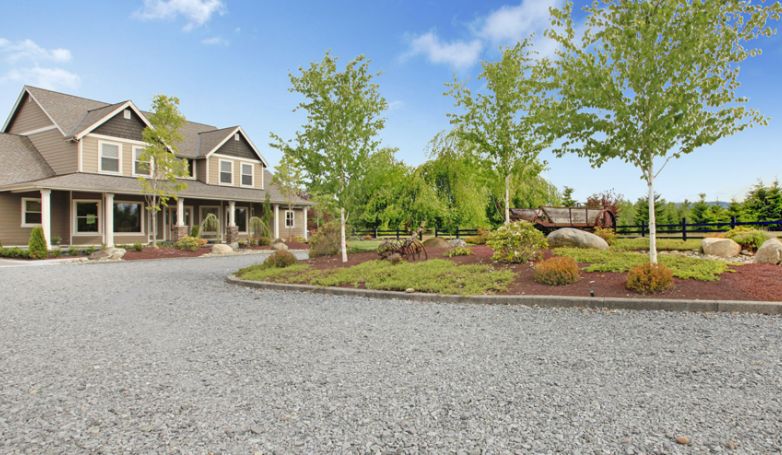
Gravel is a prevalent surface material across the United States for driveways. For most applications, the crushed stone used can be easily maintained and available in a different array of colors. To reduce maintenance, it is recommended to entrust your gravel driveway installation to an experienced grade operator. The following pros & cons provide additional variables to help you narrow down your options:
Pros:
Gravel driveways have many Pros, let’s discover them together!
Cost-effective
When you talk of the most cost-effective surface material alternatives available, gravel takes the lead-particularly for commercial properties or homes with long driveways. Nonetheless, it is required that you top-dress the gravel material every few years.
Maintenance is easy
A gravel driveway is considered an easy-to-maintain surface by many homeowners. Hence, instead of laying asphalt over gravel driveways, many homeowners stick to gravel.
Gravel facilitates the replenishment of groundwater as it is a permeable and environmentally friendly material.
Varied style
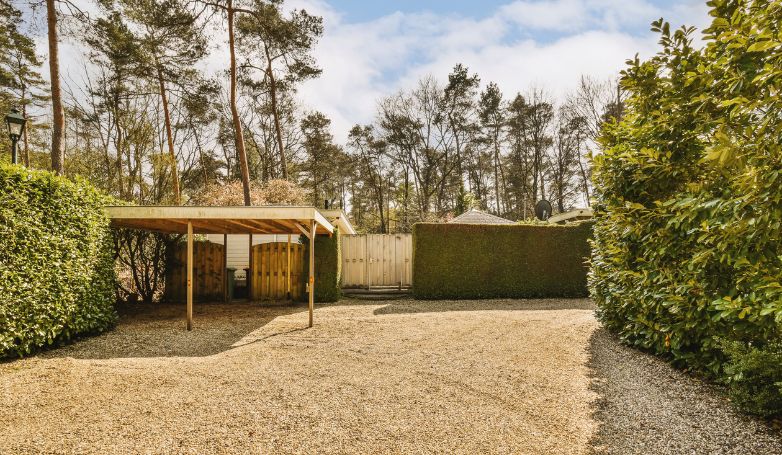
Gravel, known for its versatile aesthetic, can seamlessly complement various home styles, be it rustic or contemporary. The diverse possibilities in styling with gravel driveways allow homeowners to tailor the appearance of their outdoor landscape to suit personal preferences and architectural themes.
Quick to lay
A notable benefit of gravel driveways is the rapid installation process. Taking less than a week to install and settle, gravel driveways offer a swift solution that can be utilized immediately upon completion. This quick turnaround time contributes to the convenience of choosing gravel as a driveway surface.
Cons:
Here are the cons of the gravel driveway.
It can form ruts and sinkholes
Gravel driveways with a high level of use may be susceptible to ruts being created. Ruts are surface gaps or holes that will have to be filled in order to keep the area looking great and smooth.
It can get dirty
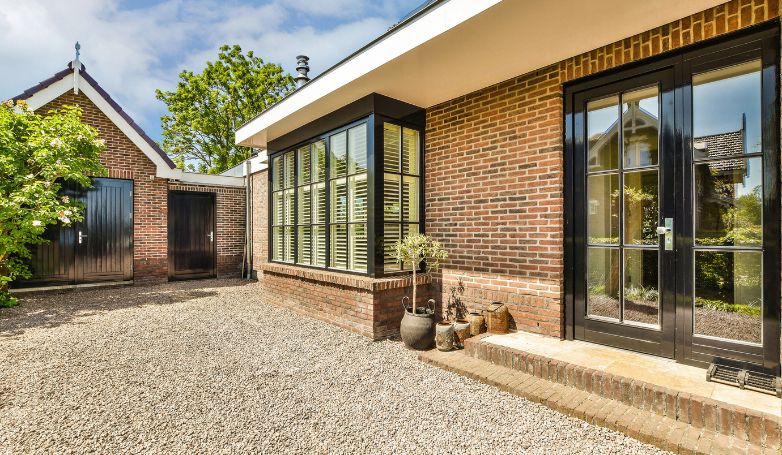
When you drive down a gravel driveway, particularly during the summer months, all the accumulated debris, dust, and dirt will start flying around. This can make your vehicles, home, and business look dirty on the outside and can be an uncomfortable experience for clients or tenants.
Removing ice and snow can disrupt rocks
The problem presented by snow and ice removal is a significant con to opting for a gravel driveway surface. Snow removal can be challenging during the winter months. Sometimes, the only way to keep the surface slip-free could be to use sand or salt over the snow & gravel.
Why you may want to switch to an asphalt surface
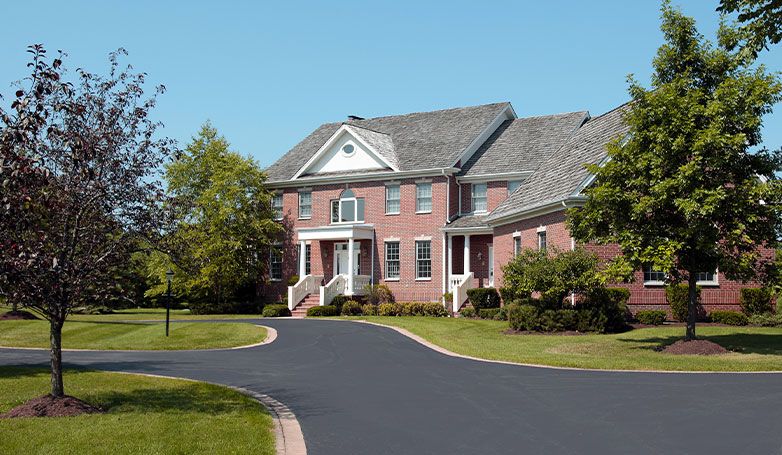
Below are some of the top reasons that many homeowners may want to switch to an asphalt surface:
- Gravel driveways need more maintenance
- An asphalt driveway is aesthetically pleasing
- Removing snow and ice becomes easier
- Switching to asphalt surface increases the resale value
- The asphalt driveway is cleaner.
Many homeowners consider laying asphalt over gravel driveways irrespective of the many benefits of gravel. Gravel is cheap and it can withstand a beating, making it a great option for rugged applications. Nevertheless, gravel also has many big disadvantages.
Gravel driveways need more maintenance
Paved driveways are considerably simpler to maintain compared to gravel. Although gravel is constantly shifting, developing divots, hills, and gaps, an asphalt driveway is nearly entirely problem-free. You only need to seal coat the driveway every 2-5 years and clean it two times a year.
Asphalt driveways are aesthetically Pleasing
Gravel can appear cluttered and uncompleted because it is loosely packed and shifting always. A paved driveway provides clean lines that add a sense of style and elegance to complement almost every home.
Removing snow and ice becomes easier
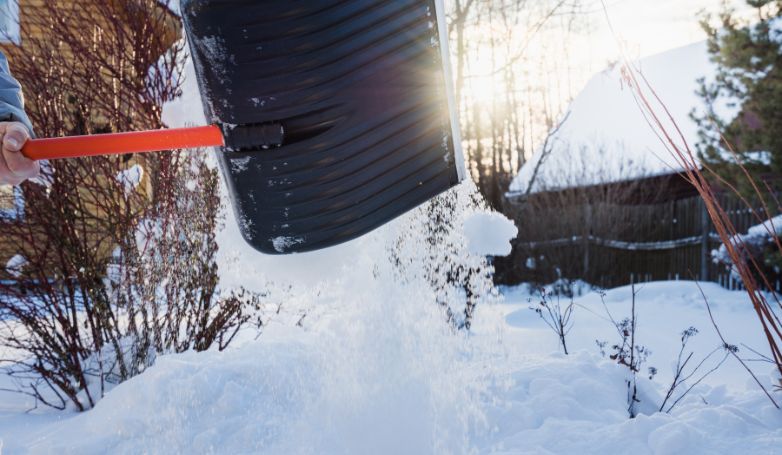
If you have snow and ice to deal with during the dead of the winter months, a paved driveway is a smart option for you. Snow appears to accumulate between bits of gravel in all the holes and openings, making it incredibly difficult to clear.
Also, you will possibly dig deep holes and ruts in the gravel that will require filling if you attempt to remove ice and snow. This is one of the reasons many homeowners prefer paving asphalt over gravel driveways.
Switching to asphalt surface increases the resale value
If you are considering selling your home soon, upgrading your driveway to a nice, new asphalt can significantly boost the curb appeal, making it much easier for you to sell your home, and even maximizing the price you can anticipate.
Asphalt is cleaner
Driving over a gravel driveway can trigger dirt, clouds of rocks, debris, and dust to fly around. This is particularly evident during the winter months but can also cause mud to develop during the rainy season. Conversely, a paved driveway lets dirt and dust settle. You are most unlikely to need a car wash each time you drive along an asphalt driveway, even on the driest days.
How asphalt is installed over gravel
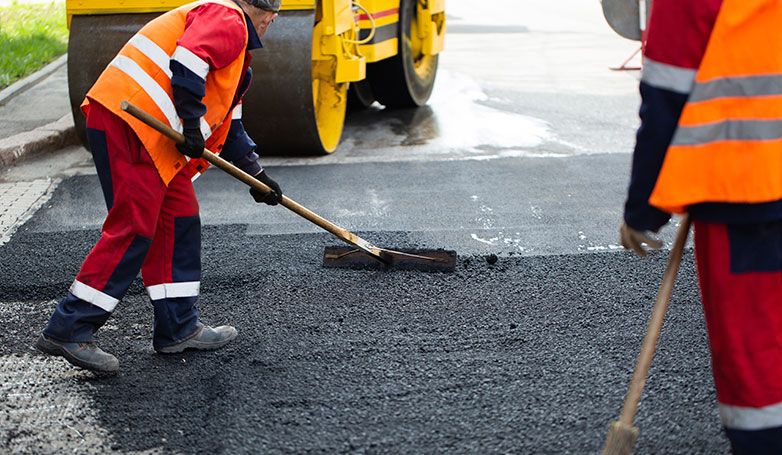
The process of installing asphalt over gravel is very straightforward. But note that this is not a DIY project, so ensure you call in a professional to handle it. It would also be best if you make your choice as per customer feedback and reviews, coupled with the contractor’s expertise and experience. The steps are highlighted below.
Step 1: Clearing and Leveling the Surface
Before asphalt is applied, it’s crucial to clear the driveway of any debris, dust, dirt, leaves, or broken branches that could interfere with the chip-seal paving process. Additionally, address any low areas in the gravel by filling them up, ensuring an even depth across the entire driveway surface.
Step 2: Ensuring Even Gravel Depth
Before progressing with asphalt application, meticulous attention to the gravel surface is paramount. In this step, not only is the removal of debris, dust, and dirt crucial, but it also involves addressing any potential irregularities in the driveway. From leaves to broken branches, thorough cleaning is imperative. Equally essential is the leveling of the gravel surface to align with its natural slope. Regular checks using a measuring tape or yardstick ensure the depth remains consistent. This meticulous approach is foundational, laying the groundwork for a seamlessly paved asphalt surface.
Step 3: Applying Heated Asphalt
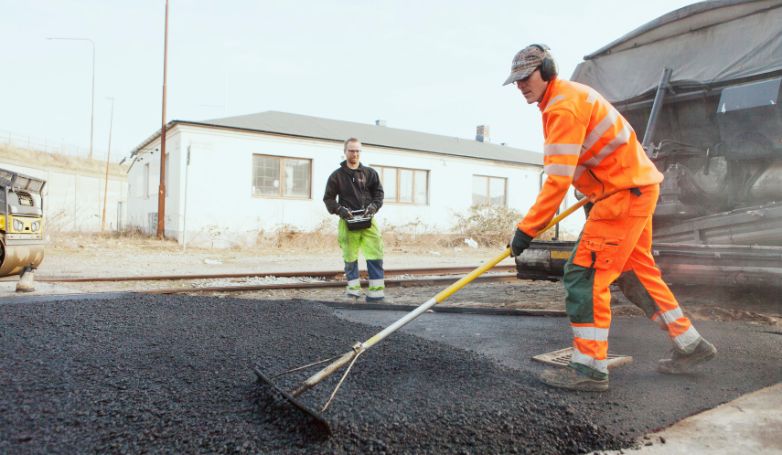
The application of heated asphalt marks a critical juncture in the transformation of the driveway. This step demands precision and expertise. To execute this, one has the option of either engaging the services of a professional or opting for a more hands-on approach by renting a seal-coating skid sprayer. The thin layer of heated asphalt is delicately sprayed over the prepared gravel surface. This process is pivotal, as it sets the stage for the subsequent steps, forming a cohesive bond between the asphalt and the meticulously leveled gravel foundation. The careful execution of this step ensures the longevity and resilience of the asphalt overlay on the gravel driveway.
Step 4: Spreading Crushed Aggregate
With the foundation set by the application of heated asphalt, the next step involves adding a layer of crushed aggregate to enhance both durability and texture. Employing wooden lutes, akin to long-handled rake-like tools, ensures an even and meticulous spread of the aggregate over the still-wet asphalt surface. This crushed aggregate, ranging from half-inch to 1-inch, plays a pivotal role in fortifying the asphalt overlay, contributing to its resilience against wear and tear. The careful and deliberate distribution of the aggregate adds a tactile quality to the driveway, creating a surface that not only withstands the test of time but also boasts a visually appealing texture.
Step 5: Compacting the Surface
The final step involves compacting the asphalt surface using either a manual roller or a mechanical compressor. If a manual roller is used, it can be filled with water to add weight, aiding in the compaction of the gravel chips into the seal-coated surface. This compression ensures a smooth, sturdy, and long-lasting asphalt surface over the gravel driveway.
Cost of installing asphalt over gravel
You can possibly install asphalt over gravel or have the gravel removed and start new, depending on the situation and your needs. Driveway comes in many shapes and sizes, meaning a wide array of paving expenditures.
With that said, the national estimated cost is between $1,500-$3,500, with some homeowners spending about $2,275 for a 2-car driveway designed with two layers of asphalt over an old gravel base.
In a nutshell, the average cost to install asphalt over gravel driveways is between $2 and $6 per square foot.
Potential alternative to installing asphalt over gravel
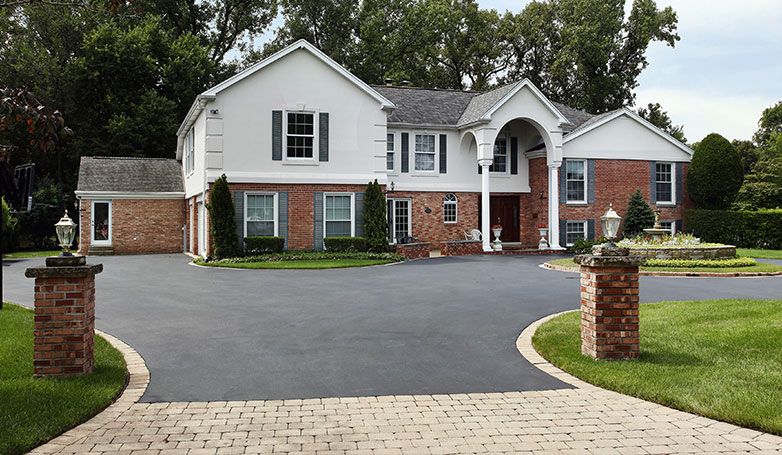
Here is an alternative that we recommend installing on gravel instead of asphalt.
Tar and chip driveway
Many homeowners may find the tar and chip driveway a strange alternative. While it may seem strange to you, there is a high probability that you have driven your vehicle on a surface made this way.
A tar and chip driveway is a relatively less costly option to asphalt but less common compared to pavers or concrete when it comes to choosing materials. It is composed of asphalt and stone, hence, the texture is a bit rougher
How tar and chip driveways are installed
While professionals are typically recommended for the installation of tar and chip driveways, if you are enthusiastic, you can independently complete the process yourself with the right tools and knowledge. The steps involved in this process are highlighted below:
Step 1: Preparing for Paving
Choose the gravel chip color and design that will constitute the top layer of the tar and chip surface. Before laying the surface, order the supply of gravel and gather the necessary equipment and materials at the worksite before commencing the tar and chip operation.
Step 2: Establishing a Solid Foundation
Use a heavy machine roller to roll out a deeply compressed dirt roadbed for the driveway. After that, a thick layer of medium crush gravel should be installed along the driveway roadbed.
This layer will serve as a foundation for the tar and chip procedure and should be strong enough to withstand a vehicle’s weight. You may not need to add an initial layer of gravel if a previously built driveway surface, such as asphalt or concrete, is already in place. This step is also necessary when installing asphalt over gravel driveways.
Step 3: Applying Liquid Asphalt
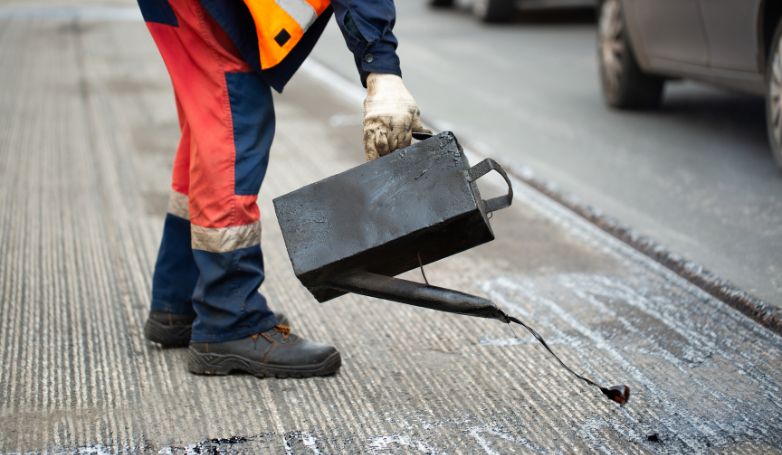
Hire a liquid asphalt sprayer(loaded with hot liquid asphalt) from a nearby equipment rental provider. Then, spray a thick layer of liquid asphalt (3/8 inch to a 1/4-inch ) over the gravel foundation.
Step 4: Spreading Gravel Chips
As the asphalt is still hot and sticky, offload the gravel chips onto the liquid asphalt. Use an industrial rake to spread the gravel to a homogenous thickness of approximately 1 inch. As you are installing the gravel chips, work forward so as to walk on the tarred region covered with chips.
Step 5: Compacting the Surface
The final step here is to use an industrial roller machine to roll the gravel chips into the tar coating. Give the driveway time to set for a minimum of 48 hrs after the gravel chips have been compressed into the liquid asphalt before driving on the surface.
What is the cost of installing tar and chip driveways
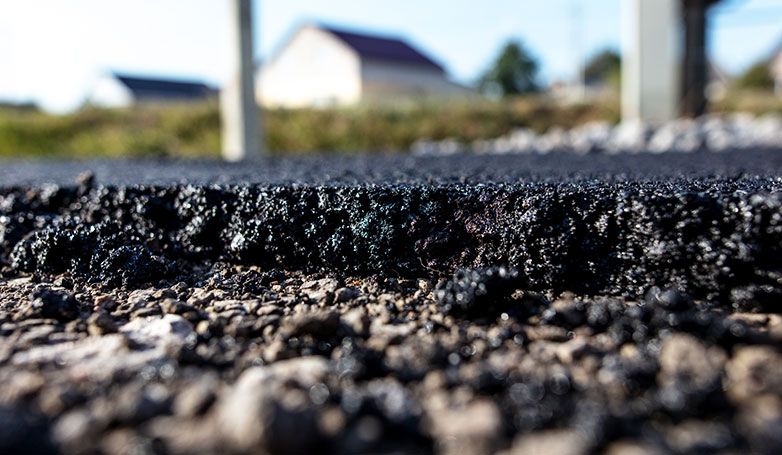
The cost of installing a tar-and-chip driveway typically falls within a range, positioning it as a middle-ground option between gravel and asphalt driveways. Generally, the expense is nearly double that of a traditional gravel driveway but remains more budget-friendly than an asphalt counterpart.
Precise cost estimates vary depending on factors such as geographical location and labor costs specific to your area. On average, you can anticipate spending between $1 and $5 per square foot for a tar-and-chip driveway installation. The typical cost tends to hover around $3 per square foot, serving as a reasonable benchmark for most driveway projects.
What is the service lifespan of a gravel driveway?
Some people believe that paving asphalt over gravel driveways extends the service life, but the truth is, proper maintenance and care can make your gravel driveway last for as long as 100 years.
One beautiful thing about gravel is that it can be continually repaired and replenished. Conversely, it is difficult to fix the wear and tear to asphalt and concrete driveways, and replacement is usually more budget-friendly than extensive repairs.
Gravel is also less susceptible to damage from freezing and thawing weather cycles, or frost heave, that can trigger strong driveway materials to crack and settle significantly.
Conclusion
Gravel driveways are an incredibly inexpensive choice, while asphalt driveways provide a long-lasting, flat surface that is easy to shovel during the winter months and easy to park throughout the year.
But before you make a choice about which material to choose, think about the benefits and drawbacks of each surface.
It would be best if you call in a professional paving contractor to examine your driveway and advise you on which option is suitable for your particular needs.

